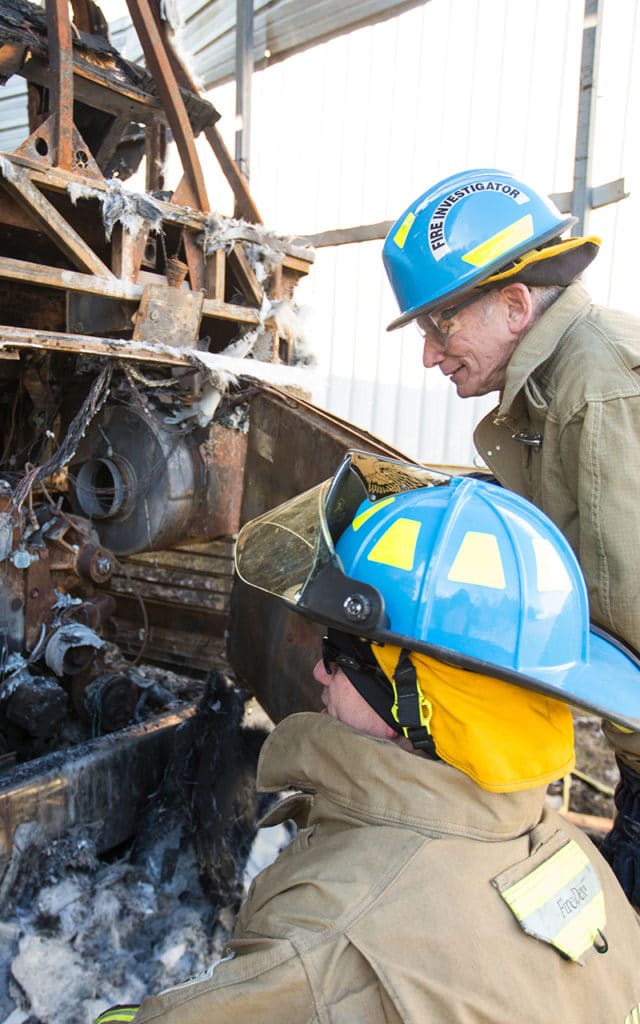Graduate Certificate
Fire Protection Engineering
Tickle College of Engineering
Program Overview
The University of Tennessee, Knoxville, offers an online Graduate Certificate in Fire Protection Engineering for students who already hold a bachelor’s degree in engineering. The program is one of only a few in the world!
Credit Hours
24
Cost Per Credit Hour*
In-State $815
Out-of-State $890
Testing Requirements
No GRE
Admission Terms
Fall, Spring, Summer
*Cost per credit hour is an estimate based on maintenance and university fees. Some programs may have additional course fees. Please contact your department for additional information on any related fees, and visit Tuition and Fees in Detail at One Stop.

Make a Difference with a Graduate Certificate in Fire Protection Engineering
Fire Protection Engineering (FPE) protects people, property, and the environment from the destructive and harmful effects of fire and smoke using the fundamental principles of advanced science and engineering. It is a growing and challenging field with opportunities for employment and advancement. The University of Tennessee is one of the few schools in the world offering Fire Protection Engineering courses!
Delivery
The 12-credit hour certificate is earned by completing the core introductory 3-hour course followed by three technical concentration courses. These classes are delivered both on-campus and through distance education formats. This is an interdisciplinary field impacting interest in various majors in Tickle College of Engineering. Students also have the option to continue graduate studies with an FPE concentration for an MS or a PhD in Electrical Engineering.
Prerequisite
The prerequisite for this certificate program is a bachelor’s degree in engineering. Applicants with related degrees (engineering sciences and architecture) can be considered based on their work experience and education but may be required to take additional prerequisite courses.
Employment Opportunities
FPE certificates and graduates are increasingly important for individuals who work in public and private sectors in risk & hazard analysis, research & development, and education.
Help protect your community by earning a Fire Protection Engineering Graduate Certificate!
Featured Courses
The 12-credit-hour Certificate in Fire Protection Engineering is earned by completing the core fundamental 3-hour course EF 563 and three three-hour technical concentration courses.
EF 563: Introduction to Fire Protection Engineering
The application of fire protection engineering principles to the safe design, wiring, and construction of buildings and infrastructure. Topics include safety and performance-based design, fire dynamics, fire hazard and risk analysis, national electrical codes, public fire service operations, detection and alarm systems, and transportation fire safety.
EF 567: Forensic Engineering
The application of forensic engineering tools to the comprehensive investigation and analysis of materials, products, structures or components that fail or do not operate or function as intended, causing personal injury or damage to property. Tools used include root cause analysis, timelines, fault trees, and failure mode and effects analysis. This is the third prerequisite course for students interested in pursuing the Fire Protection Engineering Graduate Certificate.
EF 575: High Performance Computer Modeling & Visualization
Application of high performance computer modeling to assess and visualize the impact of smoke and heat transfer to buildings, electronic equipment, and on human survivability. In-depth fire hazard analysis case studies. Advanced topics include software performance analysis and parallel processing.
EF 564: Enclosure Fire Dynamics
The application of fire protection engineering principles to enclosure fire dynamics. Topics include estimating the energy release rates of a fire, fire plumes characteristics, pressure and flows through openings, fire gas temperatures, smoke filling rates and species production, and fire modeling.
